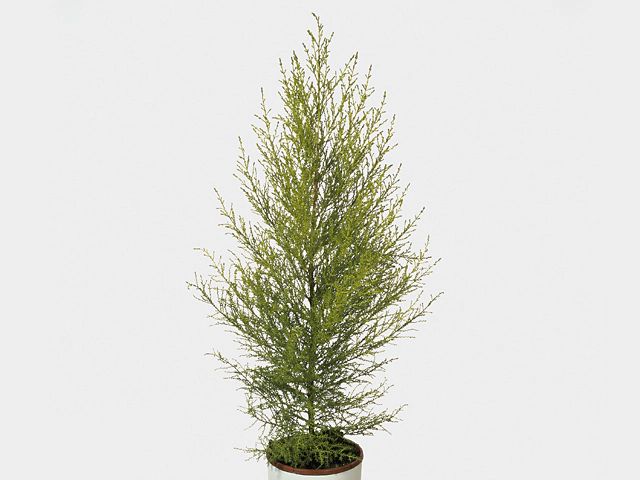Cupressus macrocarpa Goldcrest Wilma

| Fruit type | Cone |
| Leaf type | Needle |
| Leaf, general shape | Needle-shaped |
| Plant height | 60 - 70 cm |
| Structure (tissues) | Woody |
| Leaf division | Simple |
| Plant, growth type | Erect |
| Plant structure/crown structure | Compact |
| Moisture requirements | Dry; Normal |
Cupressus macrocarpa, commonly known as Goldcrest Wilma, is a unique and beautiful evergreen tree that belongs to the cypress family. It is also known as Monterey Cypress or simply Cypress. This remarkable tree has several distinctive characteristics that make it a popular choice among gardeners and landscape designers.
One of the key features of Cupressus macrocarpa is its fruit type, which is a cone. The cone-like fruit adds an interesting element to the tree, enhancing its aesthetic appeal. The tree also boasts needle-shaped leaves, which are characteristic of the cypress family. These needle-shaped leaves are slender and pointy, giving the tree an elegant and delicate appearance.
In terms of its overall size, Cupressus macrocarpa typically reaches a height of about 60 to 70 centimeters. This makes it a relatively compact tree, ideal for smaller gardens or landscape designs where space may be limited. Its growth type is erect, meaning that it grows in an upright manner, further contributing to its compact and well-defined structure.
The structure of Cupressus macrocarpa is characterized by woody tissues, which give the tree a sturdy and robust appearance. The wood of this species is highly valued for its durability and versatility, making it a popular choice for various woodworking purposes.
When it comes to moisture requirements, Cupressus macrocarpa thrives in dry to normal conditions. This makes it a suitable choice for areas with limited rainfall or where water conservation is a priority. It can withstand drought conditions thanks to its ability to store water in its foliage and roots, making it a resilient and low-maintenance option for gardeners.
Overall, Cupressus macrocarpa Goldcrest Wilma is a visually appealing tree with its cone-shaped fruits, needle-shaped leaves, and compact growth type. Its woody structure adds strength and durability to the tree, while its ability to thrive in dry conditions makes it an ideal choice for various landscapes. Whether used as a standalone specimen or as part of a larger design, this species is sure to bring beauty and charm to any setting.
Market availability index by month:
| Jan. | Feb. | Mar. | Apr. | May | Jun. | Jul. | Aug. | Sep. | Oct. | Nov. | Dec. |
|---|---|---|---|---|---|---|---|---|---|---|---|
| 3 | 3 | 3 | 3 | 3 | 2 | 2 | 3 | 3 | 4 | 4 | 3 |